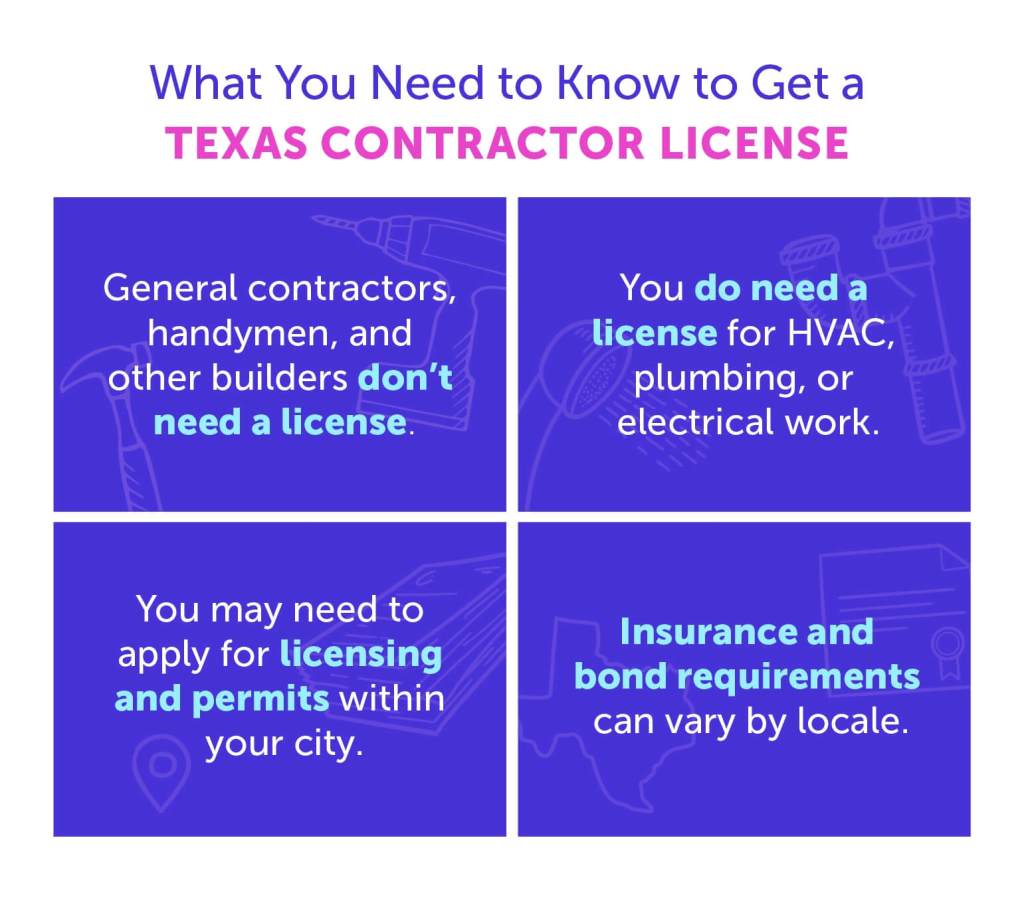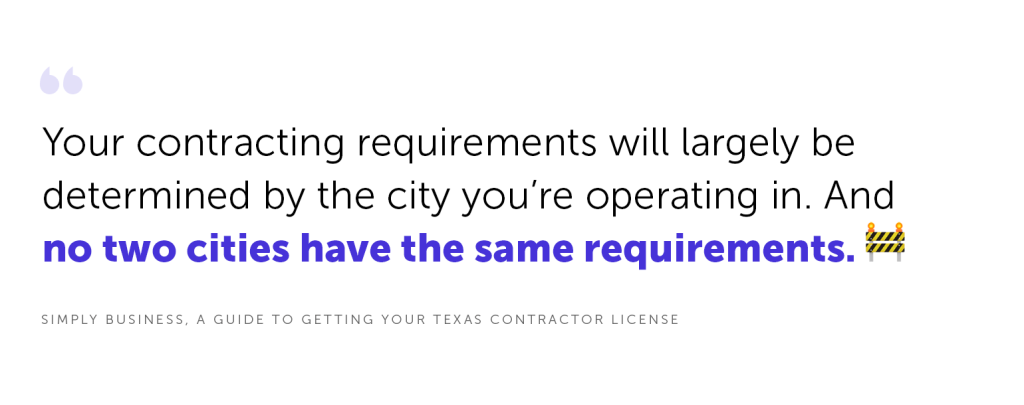Do you want to become a licensed contractor, handyman, or home renovator in Texas – but not exactly sure how to get started?
You’re not alone. There’s a lot of conflicting details out there, so if you’re not looking at the right source, you could end up with the wrong information. Plus, finding all of the information you need on various government sites can take up time you might not have, especially if you’re already building your business or are in a training program.
That’s why I did the research for you! Check out my simple guide on how to get your Texas contractor license.

Getting a Texas General Contractor License: What You Need to Know
1. TX builders, home improvement specialists, and handyman services are all set.**
The good news here: If you’re interested in becoming a general contractor, handyman, or any other type of builder, there’s no such thing as a general contractor license in Texas. That means the state of Texas doesn’t require you to get a contractor license. That’s right: Unlike in other states, there’s no need to take an exam or submit paperwork to be a contractor!
Fun fact: Once upon a time, home improvement builders had to register their businesses with Texas, but there’s no longer any requirement to become licensed. So if your focus is just on being a builder or general contractor, congrats; Texas considers you to be all set at the state level.
** However, notice that I said at the state level; in just a moment, I’ll show you why you still may need to apply for a license or a permit for your business.
2. Plumbers, electricians, and other trades need a state-wide Texas contractor license.
If you’re a contractor who plans on specializing in or offering the following trades as a secondary service, the state of Texas requires you to apply for a contractors license:
- HVAC services
- Plumbing
- Electrical work
I’ll provide a brief overview of the steps you’ll need to take to get each license, but if you need more information, just click on the links I’ll put in each contractor licensing summary.
Texas HVAC Contractor: There are two types of Texas HVAC contractor licenses:
- Class A Texas HVAC license: You can work on HVAC equipment of any size unit; and
- Class B Texas HVAC license: You can work on cooling systems of 25 tons and under, and heating systems of 1.5 million BTUs/hour and under.
In order to qualify for either of these HVAC licenses in Texas, you need to be at least 18 years of age, have at least 48 months of work or educational experience, and have passed the Air Conditioning and Refrigeration licensing exam.
If the thought of taking the Texas contractor license exam makes you break out into a nervous sweat, don’t worry; it’s a pretty straightforward exam that’s just meant to test your basic competency in your trade.
Once you’ve passed the exam, download this application form and send it (along with the $115 license fee) to:
Texas Department of Licensing and Regulation
PO Box 12157
Austin, TX 78711-2157
You’ll also need to submit proof that you have general liability insurance for your Texas HVAC business; depending on the license class you’ve selected, you’ll need a minimum coverage of at least $100,000.
Applying for a TX Contractor’s License?
You may need to show proof of business insurance to get your license.
That’s where we come in. Compare insurance quotes today.
Texas Plumbing License: There are four different types of Texas plumbing licenses you could apply for, including:
- Texas Tradesman Plumber-Limited License
- Texas Journeyman Plumber License
- Texas Master Plumber License
- Texas Plumbing Inspector License
Each specific license type has its own requirements, but in general, you’ll need to be a citizen or national of the United States, have a minimum of 4,000+ hours of experience, and have gone through specific educational courses in order to apply.
It’s really important to understand the differences in requirements, so click here if you want to dive deeper into the license you want to apply for.
If you meet the requirements of your specific license, you’ll need to pass an exam that pertains to that license (for example, the Texas Journeyman Exam, the Texas Master Exam, etc.). You can register to apply for your particular exam here.
Once you’ve passed your exam, you’ll be able to apply online for your specific Texas Plumbing Contractor license.
Texas Electrician License: To become a licensed electrician in Texas, you’ll need to register with the same Licensing Board that handles HVAC licensing. Because there are so many different Texas electrician licenses you could apply for, let’s focus on the one that comes after being an apprentice: the Texas Journeyman Electrician license.
In order to qualify for this license, you’ll need to be at least 18 years of age, have at least 8,000 hours of on-the-job training under a master electrician, and have passed the Texas Electrician licensing exam.
You’ll need to submit proof of your experience along with your application; once this experience has been approved, you’ll be sent a postcard with instructions on how to take your Texas Electrician licensing exam.
Once you’ve passed the exam, download this application form and send it (along with the $30 license fee) to:
Texas Department of Licensing and Regulation
PO Box 12157
Austin, TX 78711-2157
3. You may need to apply for licensing and permits within your city.
This is where Texas really differs from other states, as your contracting requirements will largely be determined by the city you’re operating in. And no two cities have the same requirements, so it’s definitely worth taking the time to understand how your project location affects your business and the particular license you may need to get.
It’s an understatement to say that there are a lot of cities in Texas, so here’s a quick shortcut to what licensing you may need for your particular city:
- Go to the Texas Municipal League’s City website.
- Scroll through and click on the Texas city where you’re working. You’ll be taken to that city’s government website.
- Search for “contractor license requirements”.
Each city website is different, so you might have to switch up this strategy to find what you’re looking for. But it’s a good way to ensure you’re covering all your bases with your license, and that your contracting business won’t get fined.
4. Be aware of insurance and bond requirements to get your Texas contractor license.
Whether you’re required to get your license or just need to pull a permit in your city, stay alert to any insurance or bond requirements you might have. For example, some cities in Texas may require you to have minimum general liability insurance coverage, while others may ask you to have both insurance coverage and a construction bond.
Got questions? Don’t worry – we’ll explore what’s the deal with insurance and bond requirements later in the article. But first…

Why Do Texas Contractors Need Business Insurance?
By now, you’ve probably noticed that many Texas contractors are required to have business insurance in Texas to get licensed.
The question is…why?
It turns out that business insurance – specifically general liability insurance coverage – can help minimize some of the biggest financial risks that contractors face while on the job. For example, general liability insurance can cover financial claims resulting from:
- Property damage
- Accidents
- Injuries to third parties (like to vendors or clients)
Having insurance coverage means that your policy can pay out those claims, rather than you having to dip into your business or personal savings to do so.
It’s more than just protection for your finances; it also protects your clients as well.
Say, for example, one of your employees did a rush job on a roofing project. Unfortunately, during a particularly bad rainstorm, the roof leaked, which ended up damaging the homeowner’s bedroom furniture. Your client wants you to pay the cost of repairing the roof and replacing the furniture.
However, you disagree with the claim and refuse to pay. That means the client has to sue you to have a chance of collecting that money.
Business insurance can help both you and your client avoid that situation altogether. Rather than forcing you to use your business or personal finances to pay for a claim, your insurance policy can do so.
And from your client’s perspective, they don’t have to chase you down to get you to pay for a claim. Instead, they can submit it right to your insurance provider, giving them the peace of mind to know that they’ll be covered in case something goes wrong with your work.
Given that some contractors carry a higher risk for property damages and accidents than others, the state of Texas does require specific contractors to carry business insurance.
Need help finding the right policy? No problem – we can help. Just answer a few easy questions and our free quote comparison tool will show you affordable policies from the nation’s top insurers.
Texas Contractor License Cost
If your city or county requires you to have a license, your general contractor license cost may be influenced by:
- The type of license you need to get;
- The amount of liability insurance you need; and
- The amount of bond you’ll need for your license or a specific project
Let’s take a deep dive into each of these factors to help give you a better idea of how much your Texas contractor license may cost altogether.
1. The type of contractor license you’ll need.
As previously mentioned, there is no general contractor license cost in Texas. You don’t need to have a license to work as a general contractor or handyman in Texas However, if your contracting work is more specialized – think electrician, HVAC contractor, plumber, etc. – it’s likely you’ll need to apply for a specific license before working on a project.
Here’s what the application fees look like for the most popular contractor license types:
- Texas HVAC contractor license cost: $115
- Texas electrical contractor license cost: $110
- Texas water well driller licence cost: $215
- Texas plumbing license cost: See this breakdown of Texas contractor license application fees
2. The amount of insurance you’re required to get.
Some contractors are required to take out general liability insurance in order to get licensed in Texas. If you happen to fall in that category, don’t worry – business insurance can be more affordable than you think.
3. The type of bond you may need to take out.
In Texas, most contractor license bonds range between $5,000 to $25,000. These bonds are typically taken out to get a license, or to get a permit to work on a project.
The cost of your bond will depend on the amount you’re taking out, as well as your credit score. Similar to insurance, bonds can be paid out via premiums, which are typically in the range of 0.75% to 5% of the entire bond.
Ready to Get Your Texas Contractor License?
There you have it – everything you need to know about getting your contractors license in the state of Texas.
Got more questions about getting your Texas contractor license? Let me know in the comments below!
Once licensed, don’t forget to run a contractors insurance quote to ensure you’re covered.
